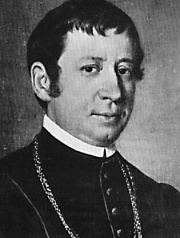Izidor Guzmics facts for kids
Izidor Guzmics (born April 7, 1786 – died September 1, 1839) was an important Hungarian theologian. He was born in a place called Vámos-Család, which is in Sopron County, Hungary. He became a Benedictine monk and spent his life studying and writing.
Contents
Early Life and Education
Izidor Guzmics began his education in Sopron. There, he learned about poetry from a teacher named Pál Horváth. This early learning helped him later in his life.
In October 1805, he joined the Benedictine order. This is a group of monks who live and work together. He left for a short time but rejoined in November 1806.
At the Pannonhalma monastery, he studied the Greek language. His teacher was Farkas Tóth. In 1812, he moved to Pest to continue his studies. There, he focused on theology, which is the study of religious beliefs.
Becoming a Scholar
While in Pest, Izidor Guzmics read many books. He enjoyed works by both German and Hungarian writers. He also helped edit a publication called Nemzeti Plutarkus. This means "National Plutarch," and it was an important work.
He also helped translate a book called Lexicon by Johann Hübner. In 1816, he earned a special degree. He became a Doctor of Divinity. This means he was highly educated in religious studies.
After getting his degree, he went back to Pannonhalma. He spent his time studying and writing about theology. He also wrote many articles for Hungarian magazines and newspapers.
Important Works and Translations
Izidor Guzmics wrote several important books about theology. These books helped explain religious teachings. One of his key works was A kath. anyaszentegyháznak hitbeli tanítása. This title means "The Doctrinal Teaching of the Holy Catholic Church."
Another important book was A keresztényeknek vallásbeli egyesülésekről. This translates to "On Religious Unity among Christians." Both of these books were published in Pest in 1822. He also wrote a Latin book called Theologia Christiana fundamentalis et theologia dogmatica. This was a four-volume set published between 1828 and 1829.
Literary Contributions
Besides his theological writings, Izidor Guzmics was also a talented translator. He translated works from ancient Greek into Hungarian. In 1824, he published his translation of Theocritus. Theocritus was an ancient Greek poet.
He also translated two famous Greek plays. One was Oedipus by Sophocles. The other was Iphigenia in Aulis by Euripides. The Hungarian Academy recognized his excellent translations. In 1838, he was made an honorary member of the Academy. This was a great honor for his work.
Later Life and Legacy
In 1832, Izidor Guzmics was appointed abbot of the Benedictine house in Bakonybél. An abbot is the head of a monastery. This monastery was very wealthy.
As abbot, he used the monastery's resources to help others. He built a special home for 150 children. This home was like an asylum, providing care and shelter. He also started a school there. This school taught harmony and singing to students. His work helped many people in the community.
Izidor Guzmics passed away on September 1, 1839. He is remembered for his deep knowledge of theology and his contributions to Hungarian literature. He also made a lasting impact through his charitable work.
 | Valerie Thomas |
 | Frederick McKinley Jones |
 | George Edward Alcorn Jr. |
 | Thomas Mensah |


